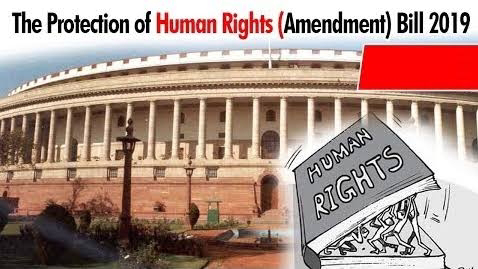PROTECTION OF HUMAN RIGHTS ACT IN INDIA
Author: - YAKASIRI UMA MAHESWARI
SRI PADMAVATI MAHILA VISWAVIDYALAYAM.
Abstract
The NHRC is a standalone entity of the government of India with the mission of promoting and protecting of human rights. It is a statutory broadly mentioned in the constitution of India. NHRC established in 1993, as per the provisions of the Protection of Human Rights Act, 1993 which was amended in 2006.Human rights are an integral part of society and human rights in India are monitored by the NHRC. NHRC acts as Watchdog of Huma Rights in the Country. NHRC looks over the rights that are related to life, dignity, liberty and equality of the individual that is defined in section 2(1) of the Protection of Human Rights Act. In 1948, United Nations adopted the UDHR. In 1991, the Paris principles were established by the NHRC. In 1993, the UN adopted these Paris principles at its General Assembly. NHRC comprises of a chairperson, the chairperson should be a retired chief Justice of India. There should be one member who is, or has been, a Judge of the Supreme Court. There should be one member who is, or has been, the Chief Justice of the High Court. Presently Justice H. L. Dattu is the Chairperson of the NHRC. On the recommendation of a committee, the president of India appoints the Chairperson and the members of the NHRC. The Committee consists of the Prime Minister of India, Home Minister of India, Speaker of Lok Sabha leader of Opposition, Deputy Chairperson of Rajya Sabha. The functions of the NHRC as stated in Section 12 of the Protection of Human Rights Act, 1993 includes enquiry into complaints of violation of Human Rights. NHRC may investigate any complaints relating to human rights violations in India or Suo-Moto. The NHRC may intervene in any legal proceedings relating to any alleged violation of human rights. It can visit any prison or institute under the control of the State Government to observe the living conditions of in mates. Awareness about human rights and literacy through various media is promoted by NHRC in various sectors of the society.
The President of India gets an annual report from NHRC which is laid before the houses of the Parliament. NHRC has limited Jurisdiction over cases related to armed forces. The recommendations made by the NHRC are not binding. State Human Rights Commission was established for the promotion and safeguard of human rights in the Country. SHRC prosecute Huma Rights violations in matters covered by the Indian Constitution’s Seventh Schedule State List and Concurrent List. Official Gazette Notifications have established State Human Rights Commissions in 26 States. SHRC can inquire into violation of Human Rights only in respect of subjects mentioned in the State List II and Concurrent List III of the 7th Scheduled of the Constitution of India. SHRC consists of 3 members including Chairman. Retired Chief Justice of the Human Rights Commission can be the Chairperson of the Commission. A person with practical experience as well as knowledge related to Human Rights issues. The person should have a member minimum experience of 7 years as a District Judge. SHRC can intervene in the proceedings of the courts which involves any type of allegation regarding violation of Human Rights. Recommend measures for effective implementation of the safeguards provided in the constitution. Provide encourage to non-governmental Organization works in the field of Human Rights. West Bengal was the first State to establish the SHRC in India on 31st January, 1995. Uttarakhand is the Last State which established the SHRC in India. SHRC is given complete power to manage the whole process independently. It has full powers similar to a civil court and conducts court-like proceedings. SHRC has limited Jurisdiction and can only investigate cases related to human rights violations in India. SHRC has no enforcement powers and relies on the government to implement its recommendation. SHRC doesn’t have the authority to take action against violations of Human Rights. SHRC has little Jurisdiction over cases that concern the armed forces.
Key words:- State Human Rights Commission, National Human Rights Commission, implementation, organizations, Judicial Proceedings.




![Freedom of Speech in India [Indian Supreme court and Law of Sedition]](https://blogger.googleusercontent.com/img/a/AVvXsEiGLLUmLKq5Da6xDZplasOZHKRj-jOhWPkoeuy0_Eq757tUpOiHz-xooXwIlAjF0-hmBfi-TtMIv6on_sVgBXVq4wbWwnbsqLOcNX22S8C2aSq-ZuK3vn9wWAx8tXByYOBfwc0hs6b8RJV84YNFG2greouGKjup6g8kN-xVlchW33VHdSSmrhLC1BUEVbGp=w680)





